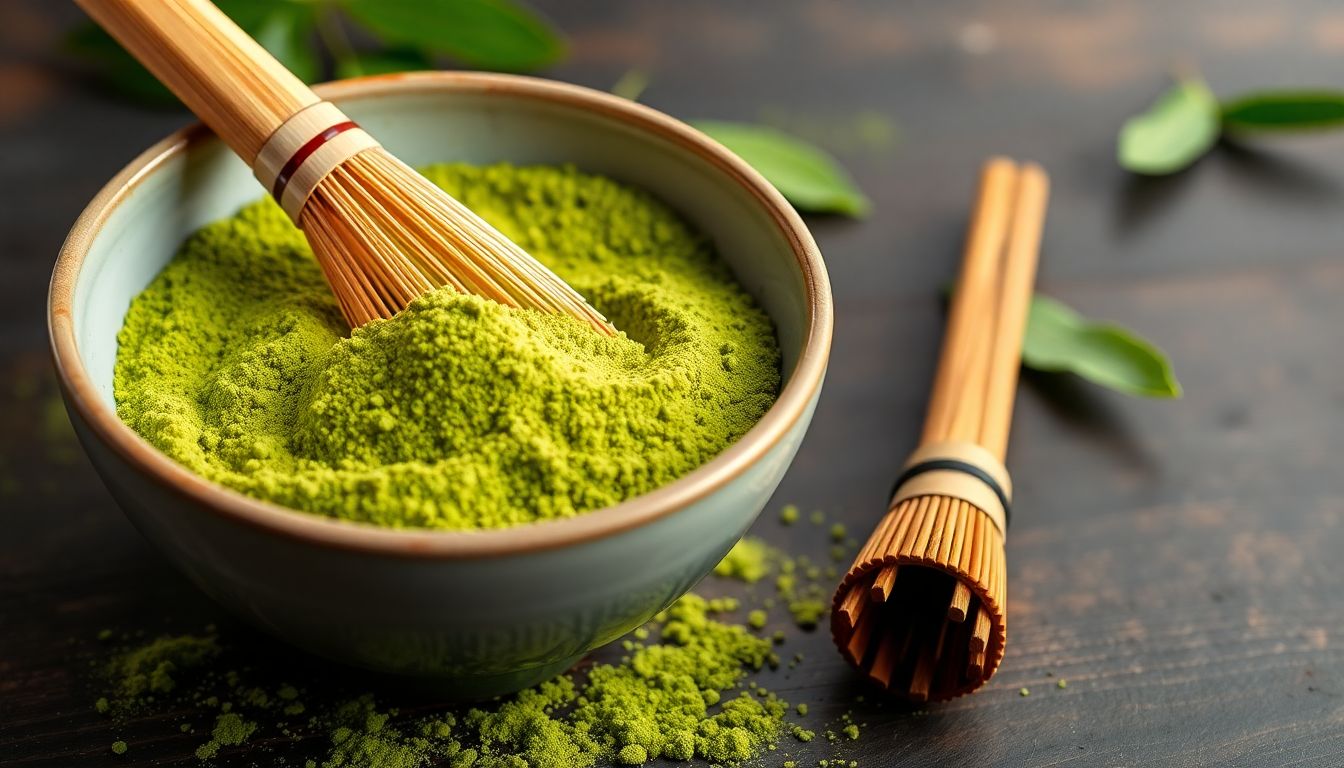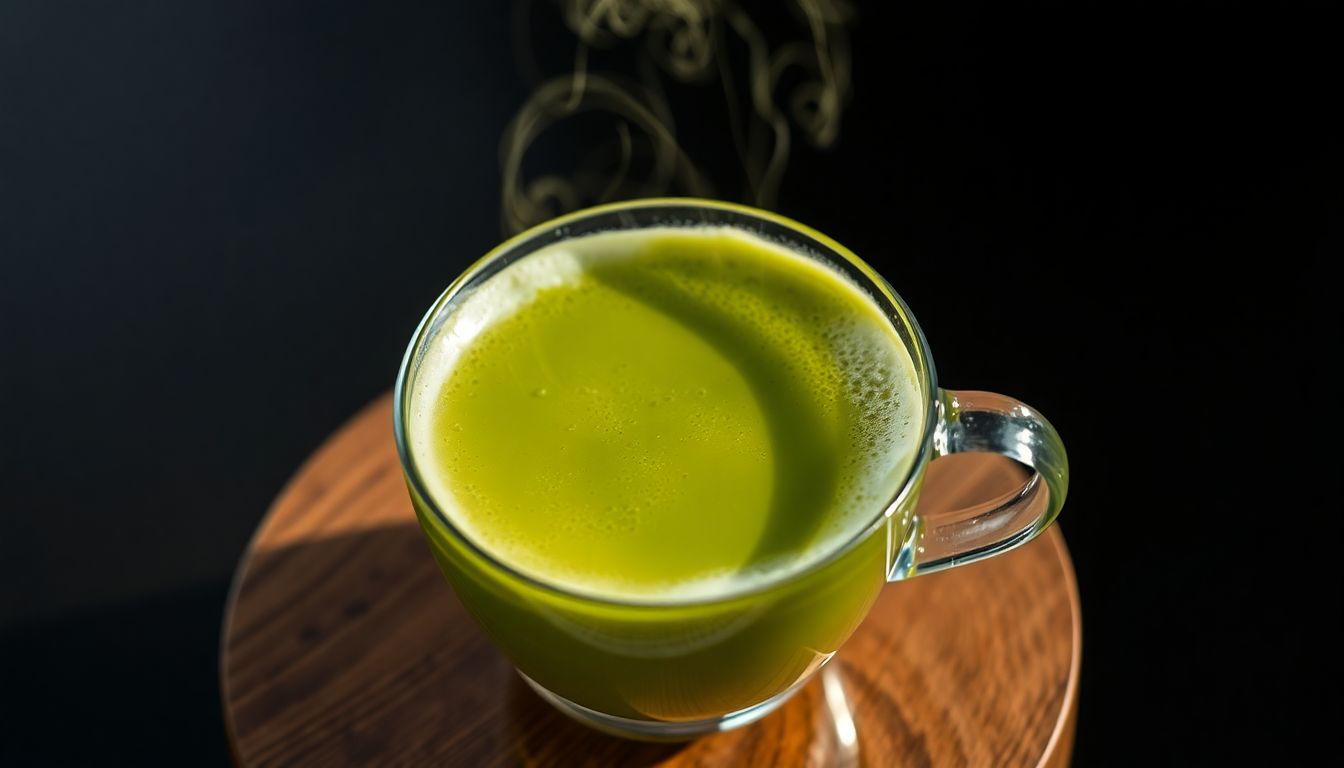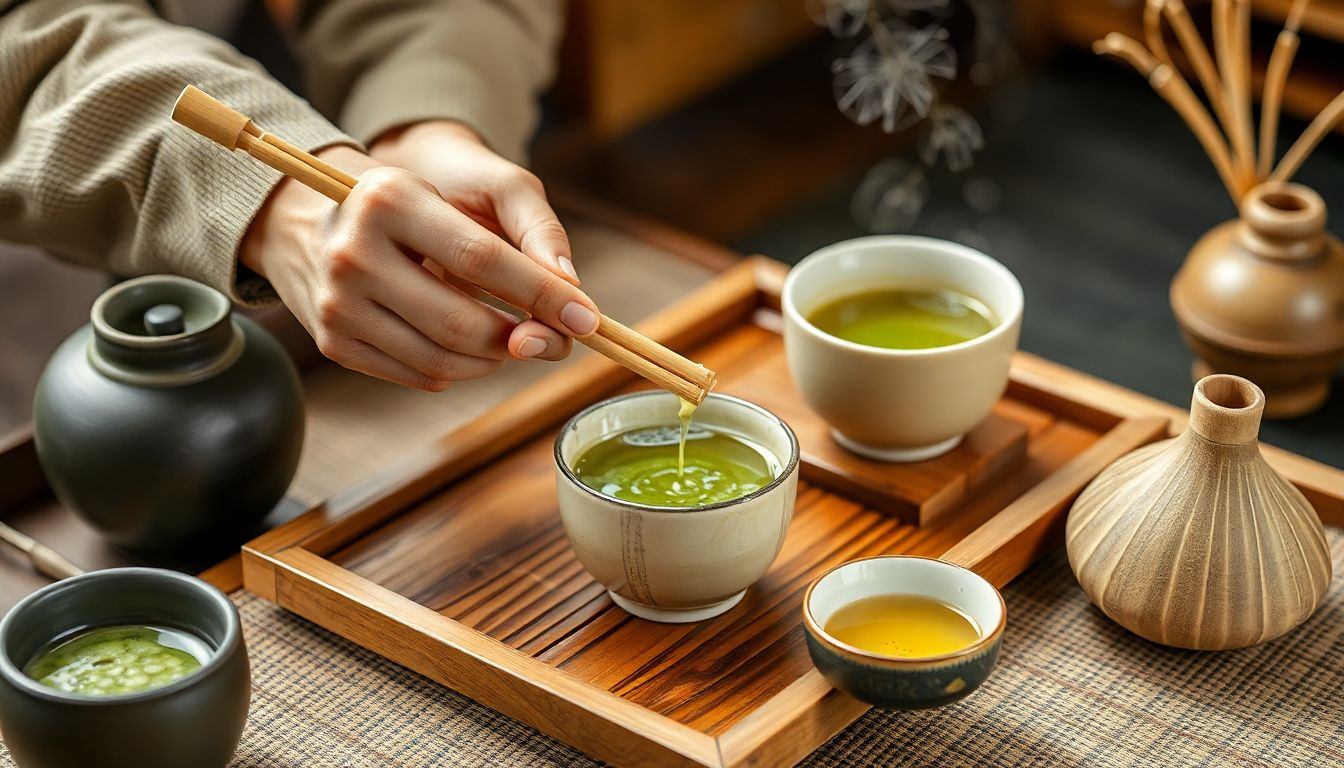Matcha tea is not just another trendy buzzword in the wellness world; it’s an age-old tradition steeped in history and revered for its profound health benefits. Unlike your average green tea, matcha is a powerhouse of nutrients, offering a concentrated form of everything that makes tea a beloved beverage across the globe. The meticulous process of growing and harvesting matcha elevates it from a mere drink to a ritual, a practice intertwined with mindfulness and appreciation for the finer things in life. Let’s delve into the rich world of matcha tea, exploring its unique characteristics, health benefits, and versatile uses.

Discover Matcha Benefits
Learn about the unique qualities and health benefits of matcha tea, along with preparation tips and more.
– What is Matcha? Matcha is a finely ground powder made from specially grown green tea leaves, offering a vibrant color and distinct flavor.
– Health Benefits: Matcha is rich in antioxidants, boosts metabolism, detoxifies the body, calms the mind, and enhances mood while providing essential vitamins and minerals.
– Using Matcha: Enjoy matcha in various ways, such as in smoothies, baking, oatmeal, and lattes for a delicious and nutritious boost.
What is Matcha?
Matcha is a fine, vibrant green powder made from specially grown and processed green tea leaves. Unlike traditional teas, where you steep the leaves and discard them, matcha involves consuming the entire leaf, which is why it is so rich in nutrients. The process begins with shading the tea plants for about three weeks before harvest, a technique that increases chlorophyll production and enhances the amino acid content, giving matcha its distinctive rich green color and umami flavor. The leaves are then hand-picked, steamed, dried, and ground into a fine powder using granite stone mills.
This meticulous process sets matcha apart, making it a premium product with a unique profile of flavors and health benefits. The ceremonial significance of matcha in Japanese culture, particularly in tea ceremonies, underscores its importance not just as a beverage but as an experience. This ceremonial grade matcha is different from culinary grade matcha, which is used for cooking and baking. Understanding these distinctions is crucial for anyone eager to explore the depths of what matcha has to offer.
What is the difference between Matcha and regular green tea?
While matcha and regular green tea come from the same plant, Camellia sinensis, the similarities largely end there. The primary difference lies in their cultivation and processing. Regular green tea leaves are grown under full sun, while matcha leaves are shaded, which enhances the tea’s theanine and caffeine content. This shading process leads to the production of more chlorophyll, which is responsible for matcha’s vibrant color and increased antioxidant properties.
Regular green tea is also brewed, meaning you steep the leaves in hot water, then discard them. In contrast, matcha involves whisking the powder directly into hot water, allowing you to consume the entire leaf and all its nutrients. This difference in preparation results in matcha having a higher concentration of antioxidants and nutrients compared to regular green tea. According to a study published in the Journal of Chromatography, matcha contains 137 times more antioxidants than low-grade green tea. This is a significant difference, especially for those seeking specific health benefits from their tea.
What are the health benefits of Matcha?
The health benefits of matcha are vast and well-documented, making it a superfood in its own right. From boosting metabolism to enhancing mood, matcha can be a wonderful addition to a healthy lifestyle.
1. Matcha is rich in antioxidants
Antioxidants are compounds that help neutralize free radicals in the body, preventing cell damage and chronic diseases. Matcha is especially rich in catechins, a type of antioxidant that is more potent than vitamins C and E. The most powerful catechin found in matcha is epigallocatechin gallate (EGCG), which has been linked to reducing inflammation, aiding in weight loss, and even preventing cancer. In fact, a study published in the American Journal of Clinical Nutrition found that matcha contains more catechins than any other form of green tea.
2. Matcha boosts metabolism and burns calories
Matcha can be a powerful ally for anyone looking to shed a few extra pounds. The catechins in matcha, particularly EGCG, have been shown to increase the body’s thermogenesis, which is the rate at which calories are burned. According to research from the University of Chicago, drinking matcha can increase daily energy expenditure by up to 43%, resulting in more calories burned throughout the day. This makes matcha an excellent supplement for those looking to enhance their metabolic rate naturally.

3. Matcha detoxifies the body
The chlorophyll content in matcha not only gives it its striking green color but also acts as a natural detoxifier. Chlorophyll helps to remove heavy metals and chemical toxins from the body, promoting overall health and well-being. Regular consumption of matcha can support liver function, which is crucial for detoxification. A study in the Journal of Medicinal Food emphasizes how chlorophyll and its derivatives have potential liver-protective properties, underlining matcha’s role in supporting detoxification.
4. Matcha calms the mind and relaxes the body
Matcha contains L-theanine, an amino acid known for its calming effects. L-theanine promotes alpha wave activity in the brain, which induces a state of relaxed alertness. This is why drinking matcha can provide a calm energy boost, unlike the jittery feeling often associated with coffee. A study from the University of Bristol found that participants who consumed matcha experienced reduced stress levels and improved cognitive performance, showcasing its ability to enhance mental clarity while promoting relaxation.
Personal Experience with Matcha’s Calming Effects
As a busy professional, I often found myself overwhelmed with stress and anxiety, especially during peak work seasons. This was until I was introduced to matcha tea by my colleague, Sarah. She raved about its calming effects and how it helped her focus during long workdays.
Curious, I decided to give it a try. I ordered a high-quality ceremonial matcha powder and prepared my first cup following Sarah’s instructions. As I whisked the vibrant green powder with hot water, I couldn’t help but feel excited. The first sip was a revelation; the smooth, rich taste was unlike any tea I had ever had.
To my surprise, the effects were almost immediate. Within minutes, I felt a wave of calm wash over me. My mind, which had been racing with deadlines and to-do lists, began to settle. I was able to concentrate on my work with a newfound clarity, making me more productive and less anxious. Over the weeks, I incorporated matcha into my daily routine, often enjoying it mid-afternoon when I needed a mental boost.
Reflecting on my experience, I’ve come to appreciate matcha not just for its health benefits but for its ability to transform my stressful days into more manageable ones. It taught me the value of taking a moment for myself, savoring a cup of tea, and restoring my focus. Now, matcha is an essential part of my daily wellness routine, reminding me to pause and breathe amidst the chaos of life.
5. Matcha enhances mood and aids in concentration
The combination of L-theanine and caffeine in matcha can improve mood and cognitive function. This duo works synergistically to enhance concentration and focus, making matcha a perfect beverage for work or study sessions. Many people, including myself, have replaced their morning coffee with matcha, finding that it offers a more sustained energy boost without the afternoon crash. This has been corroborated by a study in the journal Nutritional Neuroscience, which highlights how this combination enhances mood and cognitive performance.
6. Matcha provides vitamin C, selenium, chromium, zinc, and magnesium
Apart from antioxidants, matcha is also a good source of essential vitamins and minerals. It contains vitamin C, which supports immune function, selenium, which acts as an antioxidant, chromium, which helps regulate blood sugar levels, zinc, which aids in immune function and wound healing, and magnesium, which is crucial for numerous biochemical reactions in the body. This nutrient profile makes matcha a comprehensive addition to any diet.
7. Matcha is an excellent source of fiber
Fiber is an essential part of a healthy diet, aiding in digestion and promoting gut health. Matcha contains a good amount of dietary fiber, which can help regulate blood sugar levels, lower cholesterol, and improve digestion. Unlike many other sources of fiber, matcha can be easily incorporated into various dishes, adding nutritional value without altering taste significantly.
8. Matcha is a good source of iron
Iron is vital for transporting oxygen throughout the body and supporting energy levels. Matcha provides a plant-based source of iron, which can be particularly beneficial for those following vegetarian or vegan diets. Consuming matcha with a source of vitamin C, such as citrus fruits, can enhance iron absorption, making it even more beneficial as part of a balanced diet.
How to prepare Matcha tea
Preparing matcha tea is an art form in itself, one that demands precision and patience. It begins with sifting about 1-2 teaspoons of matcha powder into a bowl to remove any clumps. Next, add about 2 ounces of hot water, preferably at 175°F, to the bowl. Using a bamboo whisk, or chasen, whisk the matcha briskly in a zigzag motion until it becomes frothy.
The result should be a smooth, creamy cup of tea with a perfect layer of froth on top. This preparation method not only enhances the flavor but also honors the traditional practices of Japanese tea ceremonies. For those who prefer a milder drink, adding more water or milk can create a matcha latte, perfect for sipping on a lazy afternoon.

How to store Matcha tea
Storing matcha properly is crucial to maintaining its freshness and flavor. Matcha should be kept in an airtight container, away from light, heat, and moisture. Ideally, it should be stored in the refrigerator to preserve its vibrant color and potent antioxidants. Once opened, it’s best to consume matcha within a month to enjoy its full range of benefits. For long-term storage, unopened matcha can be kept in the freezer, ensuring it remains fresh and flavorful over time.
Is Matcha safe for everyone?
While matcha offers numerous health benefits, it may not be suitable for everyone. Those sensitive to caffeine or with certain medical conditions should consult a healthcare provider before incorporating matcha into their routine. Pregnant or breastfeeding women should also seek medical advice, as high caffeine intake can have adverse effects. However, for most people, moderate consumption of matcha, about 1-2 cups per day, is considered safe and beneficial.
Is there caffeine in Matcha?
Yes, matcha contains caffeine, but it differs from the caffeine found in coffee. The presence of L-theanine in matcha results in a slow release of caffeine, providing a more prolonged and stable energy boost without the typical crash associated with coffee. On average, a serving of matcha contains about 70 milligrams of caffeine, which is less than a cup of coffee but still substantial enough to increase alertness and concentration.
What does Matcha taste like?
The taste of matcha can be described as rich, creamy, and slightly vegetal with a hint of sweetness. High-quality matcha has a smooth, umami-rich flavor, while lower grades might taste more astringent or bitter. This taste profile makes matcha a versatile ingredient, suitable for both beverages and culinary uses. Its unique flavor can elevate a variety of dishes, adding depth and complexity to everything from smoothies to baked goods.
How to use Matcha powder
Matcha powder’s versatility extends beyond traditional tea preparation. Its unique flavor and health benefits make it a popular ingredient in various recipes, transforming everyday meals into nutrient-packed delights.
1. In smoothies
Adding matcha to smoothies is a great way to boost their nutritional profile. Its earthy flavor pairs well with fruits like bananas, berries, and mangoes. Simply blend a teaspoon of matcha powder with your favorite fruits, a handful of spinach, and a splash of almond milk for a refreshing and energizing drink.
2. In baking
Matcha can add both color and flavor to baked goods. From matcha-infused cookies to cakes and muffins, the possibilities are endless. Replace a portion of the flour in your recipe with matcha powder to incorporate its health benefits and subtle sweetness into your treats.
3. In oatmeal
Stirring matcha into your morning oatmeal can transform it into a vibrant, antioxidant-rich breakfast. Combine matcha with oats, chia seeds, and your choice of milk, then top with fresh fruit and nuts for a satisfying and healthful start to your day.
4. In lattes
Matcha lattes have become a staple in cafes worldwide. To make one at home, whisk matcha powder with hot water, then add steamed milk and a sweetener of your choice. This creamy beverage is perfect for those who enjoy a comforting yet invigorating drink.
Where to buy Matcha tea
High-quality matcha can be found at specialty tea shops, health food stores, and online retailers. When purchasing matcha, look for products that specify their origin and grade. Japanese matcha is often considered the gold standard, with regions like Uji and Nishio being renowned for their superior quality. Online retailers like Ippodo Tea Co. and MatchaBar offer a wide selection of matcha, ensuring you find a product that suits your taste and budget.
The best brands of Matcha tea
When it comes to matcha, not all brands are created equal. Some of the best matcha brands known for their quality and authenticity include:
- Ippodo Tea Co.: Known for its ceremonial grade matcha, Ippodo has been producing high-quality tea in Kyoto for over three centuries.
- MatchaBar: This brand offers both ceremonial and culinary grade matcha, sourced directly from Japanese tea farms.
- Jade Leaf Matcha: With a focus on organic matcha, Jade Leaf provides a variety of grades suitable for both drinking and cooking.
- Kiss Me Organics: Offering USDA organic certified matcha, this brand is popular for its vibrant color and smooth taste.
Choosing the right matcha brand is crucial for experiencing the full spectrum of flavors and benefits this remarkable tea has to offer.
In conclusion, matcha tea is more than just a drink; it’s a celebration of nature, tradition, and health. Its rich history, coupled with its impressive range of benefits, makes it a staple for those seeking a more mindful and health-conscious lifestyle. Whether enjoyed as a traditional tea or incorporated into modern recipes, matcha’s appeal is undeniable, offering a sensory experience that is as invigorating as it is soothing. So, why not indulge in the vibrant world of matcha and savor its unique blend of flavor and wellness?